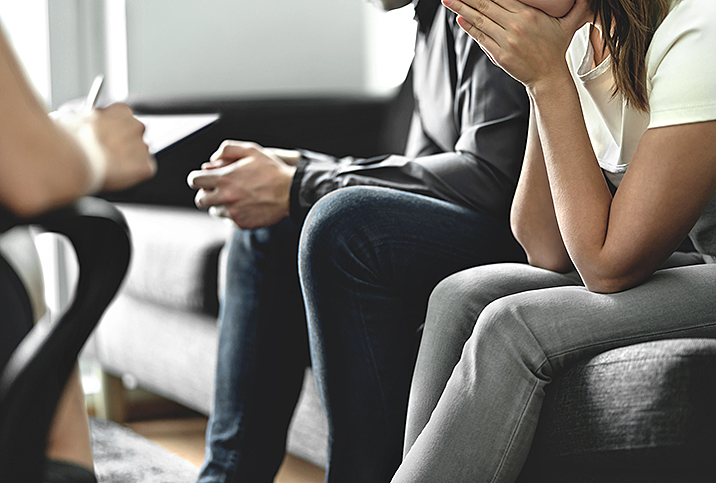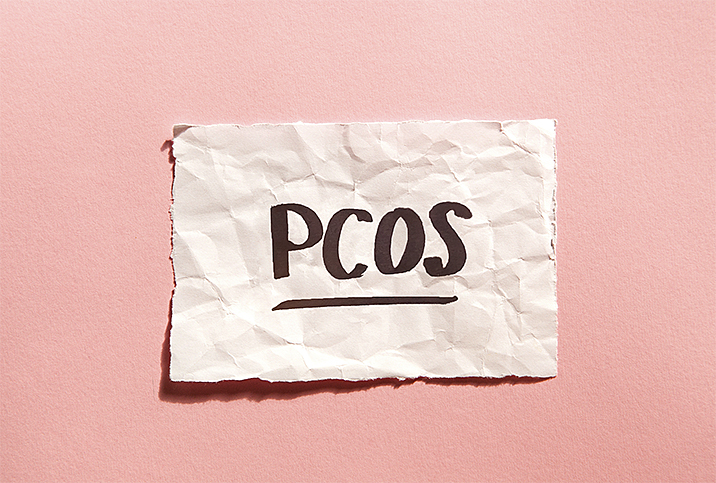My Body Won't Let Me Have Sex

Often called an "invisible disease," endometriosis attacks unseen areas of the body and is often brushed off as menstrual pain. Patients don't always look sick but that doesn't mean that they aren't. While this type of illness poses challenges for partnerships, especially in terms of intimacy, it doesn't mean your relationship will dissolve.
Endometriosis impacts 1 in 10 people during their reproductive years and affects roughly 176 million individuals worldwide. The painful and chronic condition occurs when tissue that typically grows inside of the uterus instead grows outside of the uterus. This tissue can be found on the ovaries, recto-vaginal septum, fallopian tubes, bladder and bowels. Symptoms of endometriosis include painful periods, ovulation, pain during sex, heavy bleeding, fatigue and infertility. It's a condition that's notorious for being difficult to diagnose and doctors typically write off the pain as menstrual cramps or IBS.
Endometriosis can wear on relationships, too. Active sex lives can be snuffed out for people who have the disease. Being intimate with someone can be painful and sometimes impossible, leading to disinterest and frustration. Dr. Lexx Brown-James from the Institute of Sexuality and Intimacy in Creve Couer, Missouri, explained that people should remind themselves that having endometriosis doesn't make them defunct. Looking for alternative ways to have intimacy is the answer. Deep kissing, body rubbing, anal play, nipple play are all options for pleasure.
"You will have fears and disappointment and that's normal," Brown-James said. "A support to that partner is also being willing to explore other ways to enjoy sexual pleasure and inviting your lover to engage with you in those capacities."
Tanya Jagger, 37
While undergoing surgery for polycystic ovarian syndrome in 2006, Tanya Jagger's doctors found evidence of endometriosis in her womb. Since her diagnosis, Jagger has experienced so much frequent heavy bleeding that she needs regular blood and iron transfusions. Because of her debilitating abdomen pain, Jagger said she's lucky if she can have sex three or four times a year.
Jagger and her partner of 10 years use experimental methods of foreplay to feed their appetite. The most difficult reality for the couple was that Jagger can't have children due to the impact of her endometriosis. According to the Journal of Assisted Reproduction and Genetics, infertility affects 30 to 50 percent of patients with the disease. Moreover, women who are infertile are six to eight times more likely to have endometriosis than women who are fertile.
"Finding someone who is able to help me navigate through hard times makes the good times better for us and makes us stronger," Jagger said. She added that her partner is a "massive support system," who doesn't let her health concerns get in the way of their connection.
Jacob Wilson, 34, and Maria Tanner, 33
"I didn't even know what endometriosis was," admitted Jacob Wilson after his wife's diagnosis in 2017. After living with painful intercourse and painful orgasms for several years, Maria Tanner finally got her answer as to what was wrong when a doctor found cysts during a pelvic exam and further testing led to an endometriosis diagnosis. "Although I know he's supportive, it was a difficult conversation," said Tanner. "It's like, where do we go from here?"
After numerous doctor visits and Google searches, Wilson said he was devoted to being the best partner he could be for Tanner. "I think most people become frustrated in their relationship because they don't know enough, they don't educate themselves," he said.
A 2017 study published in Human Reproduction, reported that a significant majority of the cis-men surveyed found that endometriosis strained their relationships. Plans for having children, sex, intimacy, work and income were all compromised due to the condition. Many men reported feeling helpless and frustrated. In this study, almost half of the couples stated that their sex lives were almost or completely non-existent. While not all patients with endometriosis experienced painful sex, most of them did experience fatigue, low libido, stress and bleeding during or after sex. For cis-women, a 2014 study published in BMC Women's Health looked at the impacts of sexual dysfunction and how it can lead to the deterioration of a relationship. Most women reported infrequent sex due to pain during or after as well as bleeding and frustration.
Even though the couple doesn't have as much sex as they would like, Wilson said they experiment and come up with alternative activities for the bedroom. "Oral sex and certain sex toys are our best friends," Tanner said.
In addition to their intimate life, Tanner said her sense of self changed too. In a 2020 study that focused on identity and endometriosis, participants reported self-silencing to not burden their partner. This experience led to one woman calling endometriosis the "the most lonely condition" she could imagine. That's why Tanner decided to seek support outside of her relationship. She explained that while her partner is there for her every day, she doesn't want to rely on him. So, she sought out an endometriosis community.
Tanner's a part of various online forums (r/Endo on Reddit and the Atlanta Endometriosis Community on Facebook) and has found friends she can call or meet for coffee which she's having a difficult day. "This is my condition and it's up to me to take control of my body again. I try and do as much reading as I can. I follow endometriosis accounts and try and surround a lot of my life with endo friends." Taking the pressure off of her partner is important to her. "Sure, he's my caretaker in a lot of ways but finding [an] outside community gives me some independence."
Margaret, 21, and Ella, 23
For Margaret and her partner, Ella, understanding chronic illness was easy. Both struggle with chronic pelvic pain issues; Ella has polycystic ovarian syndrome and Margaret has endometriosis. "As a queer couple with two vaginas, I think it's easier for us to lean on one another and understand each other's pain. I feel lucky that we both incorporate patience and understanding in our everyday lives."
Two years ago on their first date, Margaret opened up about her condition right away. "I felt like it was important to mention. I didn't want the awkwardness to come up later on in the bedroom when sex hurt," she said. Luckily for the couple, pain during sex doesn't happen every time. "We use toys, lots of communication and focus on mindfulness during intimacy. It's less about an orgasm and more about connecting," Margaret said.
In addition to being intimate, these couples are cohabitating and coexisting together. If one person is feeling ill, the other has to pick up the slack. This type of tension can begin to build in relationships that are working through chronic illnesses. Finding a person who is willing to take on that role without it feeling like a burden can feel like a big ask for some people.
"Communication is at the core of our love," Margaret said. "The rest of the world may not understand that I'm sick but at least she does. For me, that's about as romantic as it gets."


















